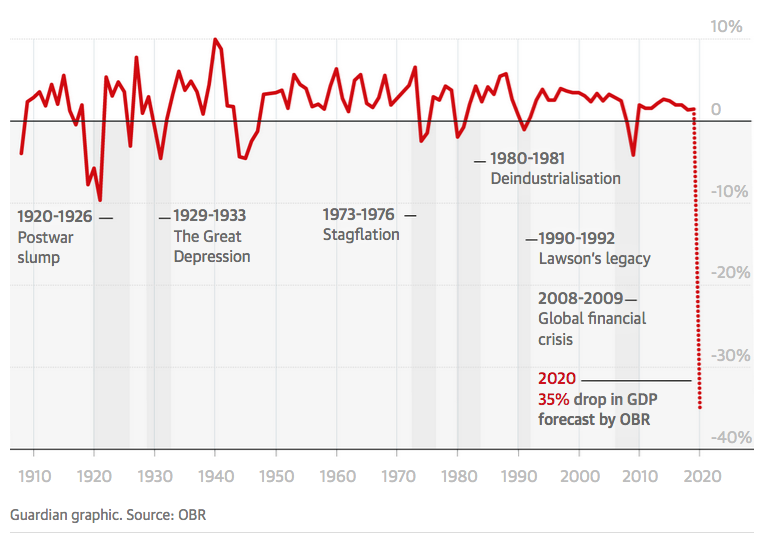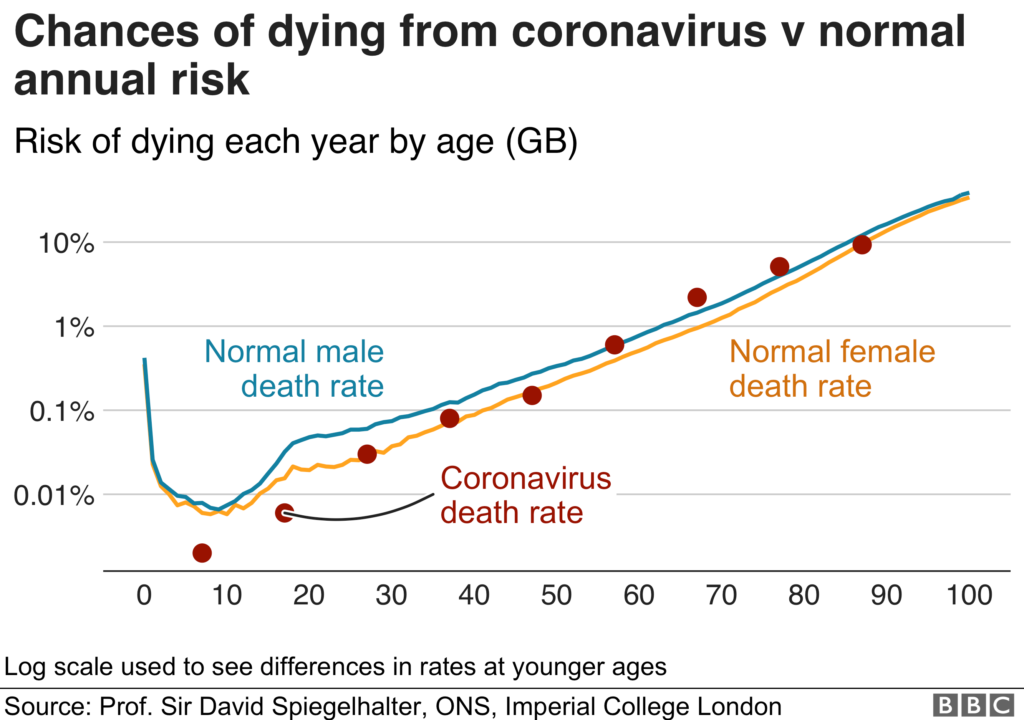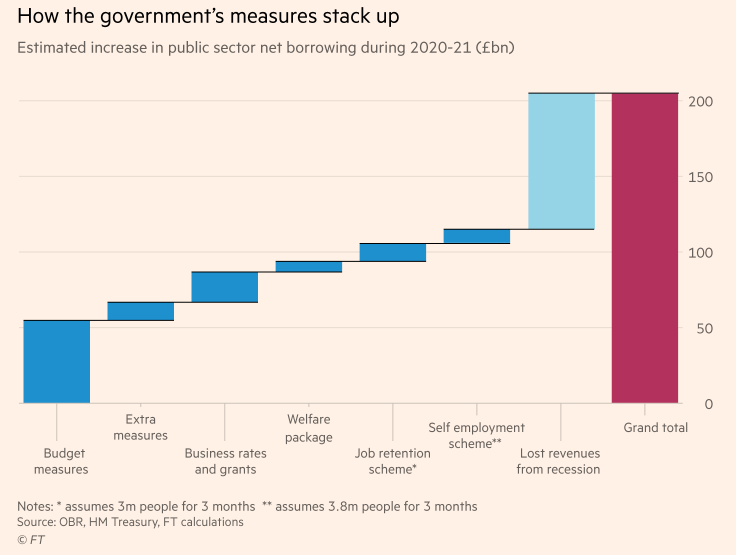A week before the UK government spun on its heels and ordered a nationwide lockdown, I got my hair cut.
While I still could.
My hairdresser and I discussed the virus, the shutdown in Italy, and how business for him had already slowed to a trickle.
I warned he’d probably have to close up entirely in a few days. I’d studied the graphs, and it was clear we were going the way of Italy. An Italian-style lockdown seemed inevitable.
But he was having none of it.
Why should there be a lockdown in the UK? This wasn’t Italy. We didn’t have lots of people dying. How could they order everyone to stay at home? People needed to get their hair cut.
And he couldn’t survive without work for weeks on end.
Who could?
Here, there, everywhere
I don’t want to single out my hairdresser for his lack of foresight.
Because ever since the novel coronavirus – SARS-CoV-2, or Covid-19 – appeared on our collective radar, most people have been confounded by events that seemed pretty predictable.
If the virus was discussed at all by Western firms and economists at the start of 2020, it was in the context of supply chain disruption.
I was astonished at talk in January and February about how China would suffer as companies permanently shifted their supply chains to nearby places like Vietnam.
The implication was this was a Chinese problem – even as the virus was already spreading to neighbouring regions and beyond.
Why wouldn’t the virus come here? And if we failed to contain it in just a dozen places, why wouldn’t it spread everywhere?
Well, we know what happened next.
The latest surprise is from people who are shocked to learn that if you switch off the economy, you barrel towards a depression.
Yet just a month ago – as every newspaper and Twitter pundit screamed at the government to impose a total lockdown instead of – they all but alleged – killing people for kicks, there was almost no talk about the economic consequences.
I felt heretical when I wrote here a few weeks ago:
I believe there’s a very high probability the strategy of isolating everyone as much as possible that is being pursued across the world will crash the global economy.
Note: This is a bad thing.
If you think we have political/inequality problems now, you won’t like it better with a couple of million suddenly unemployed in the UK alone, alongside tens of thousands of bankrupt businesses.
– Fear is a Virus, Bennallack.com, March 18, 2020
Back then even the financial press was still talking blandly about “economic downsides” and a “potential recession”.
I thought a recession was pretty nailed-on. Only the loneliness of my position gave me pause.
This blog is still new and it has no readers. So I decided to share that post with my friends on Facebook.
It’s a sign of how nervous I was about pointing out the – cough – ‘economic downside’ that I only shared it with close friends via a special list. Their response was still pretty frosty.
Now people have started to lose their incomes at a record pace – or seen their friends lose theirs – and suddenly everyone gets that you have to do some outputting to have some economic output.
This week we were told the Office for Budget Responsibility sees UK GDP plunging 35% if we continue in lockdown.
The Guardian put this decline into context for those fortunate folk who don’t spend their lives immersed in financial esoterica:

Meanwhile in the US, all measures of distress are flashing red.
For example the Empire State Manufacturing Index just came in at minus 78.2%. That’s more than twice as bad as the worst figure seen in the financial crisis.
With many millions having lost their jobs, the US unemployment rate is up to at least 12% – the worst since the Great Depression.
By the time you read this, I estimate at least 22 million Americans will have officially filed as unemployed.
I suspect the real figure could be well over 25 million, given how the State apparatus is being overwhelmed by surging demand.
All this in less time than it takes your monthly Netflix subscription to roll around.
No obvious solution to Covid-19
Did we have to go this way? I don’t believe so, although we’ll never have a counterfactual to know for sure.
As I’ve written before, one alternative would have been to exploit the restricted demographics of the victims of Covid-19.
We keep being told the virus “does not discriminate”. But we know its lethality definitely discriminates: by age and underlying health.
Given the enormously wide variation in experiences of different countries in dealing with their pandemics – hard though they are to be confident about, given the varied testing regimes – there’s probably much else going on besides. (I suspect Vitamin D, obesity, and pollution will also prove to be part of the picture.)
I concede the government probably had no choice but to order a nationwide lockdown – albeit this was partly as a consequence of its muddled initial response.
But it should have been stressed (and planned) that this was to be temporary. Maybe a month to give us breathing room.
Personally I suspect Covid-19 is massively infectious where it spreads (countries like ours, as opposed to hot countries in Africa where it seems pretty impotent, and especially in big, polluted cities with public transport systems like London and New York) but also mostly harmless.
Indeed I’ve a hunch that working back from what I guess is a pretty low mortality rate (maybe as low as 0.3%) that five to ten million Britons have had the virus, largely asymptomatically.
It also seems reasonable to assume the virus was spreading rampantly in March in places where the old and vulnerable are clustered, such as hospitals and care homes. So unfortunately the very people most likely to die from this coronavirus may have been in the firing line in the first wave.
Cast your mind back. There was none of this six-foot wide berth on the pavements going on then. Everyone was hugging, hand shaking, and going to the Cheltenham races.
If it’s as infectious as it seems, why wouldn’t it have spread everywhere? It probably did.
So what then was the alternative to opt-in economic carnage?
Like everyone I’d have preferred testing, tracing, and aggressive quarantine, but that’s much easier written than done from scratch.
As I said last time, my Plan B would have been mandatory lockdown of the over-65s and anyone else deemed vulnerable, coupled with aggressive physical distancing. No handshakes, no kisses, et cetera.
It’s instructive to look at Sweden. That country has no enforced lockdown, and while a fear-mongering Guardian stresses its deaths per million figure is higher than its neighbours, it is still not much more than half of ours.
Judging by these stats, far fewer Swedes are dying with the virus than Britons, adjusting for population.
Remember: That’s with no lockdown.
This is a bit of a flyer, but I believe it’s possible we may learn in time the whole lockdown manoeuvre was a phoney war that did nothing much to alter the natural history of the virus.
Here’s locking down you, kid
This all matters because full lockdown is the embodiment of government-sanctioned catastrophic thinking – modelling the worst that can happen and then turning every dial to 10 to try to ward off that supposed direst outcome.
It’s blown up the economy, and people’s common sense.
I know people in their 40s who leave their mail on the porch for days, then bleach it. They unpack their shopping with disposable gloves.
One of my closest friends isn’t going for walks during lockdown. He even says he’ll stay inside after the lockdown is lifted.
“Why shouldn’t I do everything I can not to get this disease?” he retorts when challenged. “Can you tell me there’s no chance I will be sick or die if I catch it?”
My friend believes this is a winning argument. In reality it only proves how detached from rationality people have become.
The sensible justification for lockdown is to curb the transmission rate of the virus and so curb the pressure on the health service – so that hopefully we won’t need, for example, the NHS Nightingale hospital in London that currently lies all but empty.
Lockdown is not so that someone like my healthy friend doesn’t get a mostly harmless virus that they’ll probably eventually get anyway.
I try to reason with him. Will he no longer eat at restaurants in case of food poisoning? Will he quarantine himself away from October to April so he doesn’t become one of the 12,000 to 17,000 seasonal flu victims in Britain each year? Will he no longer travel by accident-prone car?
What about his lifestyle? Will he stop drinking – he often goes over the limit – and will he lose weight and eat a vegetarian diet?
Of course not. His newfound ‘rational’ regard for his health extends only as far as Covid-19.
My friend recites the official death toll – roughly 13,000 in the UK as I write, though I calculate it’s probably more like 20,000 if you take into account care homes and other out-of-hospital deaths.
But he doesn’t know this statistic includes everyone who died in a hospital that tested positive for Covid-19, regardless of whether they were even showing symptoms, let alone if it killed them.
No doubt many are dying of the virus – the death rate in the UK is well above average right now.
But 13,000 were not killed by Covid-19. Probably nothing like it.
If you went out today and got hit by the proverbial bus – and then when you were tested after dying in hospital you were found to have the virus – you’d go into the coronavirus stats.
Again, regardless of whether you were even showing symptoms.
Consider this graph:

The BBC continues:
Every year, about 600,000 people in the UK die.
And the frail and elderly are most at risk, just as they are if they have coronavirus.
Nearly 10% of people aged over 80 will die in the next year, Prof Sir David Spiegelhalter, at the University of Cambridge, points out, and the risk of them dying if infected with coronavirus is almost exactly the same.
BBC, Updated 14 April
Meanwhile, any young person who is unlucky enough to die with Covid-19 is splashed across all the newspaper front pages, as if in warning to their teenage peers who are struggling to stay inside with their parents, 24/7.
Because this virus does not discriminate, remember?
Only, it does discriminate. Last I looked fewer than 100 people under-40 had tested positive for Covid-19 at death.
Most will have unfortunately had underlying health conditions.
Saving for the future
Of course if we’re doing a lockdown then we should all lock down.
I am, despite my personal misgivings and the fact I suspect I’ve already had it. The kids should, too.
My point is not that we should freestyle our actions in the face of the virus.
It is that the climate of fear we’re enduring in the UK – and which is so absent in grown-up Sweden – has distorted everything.
That’s why anytime a politician suggests we need to look for a way out of lockdown, an army of the terrified or the virtue-signalling shouts them down.
Like me, the professional pundits among them are mostly middle-class journalists writing from their comfortable home offices, enjoying their ongoing salaries, and perhaps removed from the reality of the millions who’ve lost their jobs.
They protest that we can’t put a price on health.
Firstly, we can and we do it all the time. (Learn about QALY).
Secondly, this lockdown will itself kill people.
Again this felt dangerous to write four weeks ago, but now academics are steadily popping up to say the same thing.
Even the fearful Guardian has looked into domestic abuse killings, which have already doubled.
But there’ll be lots more going on than that.
People aren’t seeing their GPs. People aren’t exercising. People are drinking more. They are deliberately socially isolated – a known marker for all sorts of bad outcomes.
This is just the start. Throw unemployment into the mix, food poverty, educational disruption, and most especially loss of tax revenues for future health spending, and it seems very possible more people will die from lockdown than from coronavirus.
You still think I exaggerate? The government is reportedly looking at 150,000 deaths as a long-term result of an ongoing lockdown.
And University of Bristol researchers estimate that with a 6.4% decline in GDP, we’ll see more loss in life expectancy due to lockdown than we saved from Covid-19.
Clearly this is all very uncertain.
However it gives lie to the idea that caring about the economic impact is simply advocating for greed.
Buy now, pay later
Just in case I’ve won you over and from now on you’ll pause a moment before shouting “Murderer!” at any politician who suggests ending lockdown would be desirable, allow me to snatch away my victory by concluding with some more economy-minded thoughts.
Because even aside from its impact on our health, lockdown is a terrible thing to hurl at the economy we all depend on.
Government and Bank of England support – while commendably swift and extensive – is implicitly picking winners and losers.
For example, self-employed people who happen to operate through a limited company are being massively disadvantaged compared to sole traders, by overnight government edict.
That would have been a fierce multi-year wrangle before.
Or take physical retailers. While the secular trend towards online shopping is clear, some were managing to adapt to a hybrid model, helped along by firms like Shopify. They (and their landlords) have been chopped off at the knees, again overnight.
Shutting down the entire economy will have broken lots of fragile connections that have taken years to build up. People and firms will make other arrangements, and so they may not be around when the switch is thrown back on. A free market is an ecosystem, where millions of entities depend on one another.
This means that after an initial growth spurt when we’re finally allowed out again, the recovery will proceed in fits and starts. Productivity will likely be dinged for years.
Entrepreneurship has fallen. Who’s starting a business now? Who will start one if saddled with debt from the upcoming recession?
That’s important because small and new companies are the lifeblood of innovation, and of job creation.
Talking of debt, all that government support doesn’t come free.
Here’s an estimate from the Financial Times:

The government is quite right to be spending money. Injecting funds now to suspend as much of the existing infrastructure as possible in economic carbonite will help kickstart growth when we do come out of lockdown.
Indeed those – especially in the US – who criticise state action as subverting the free market even when the government has already done the ultimate subversion by telling industry to go home and watch YouTube, well, that is how laissez faire capitalists get a bad name.
So yes, the state spending has to be done – but there will be a reckoning.
Hopefully the powers-that-be won’t try to austerity our way out of the deficit this time. If they do then our great grandkids will still be living with the consequences of Covid-19.
But one way or another, making up for lost output now by pulling it forward from the future will need to be paid for.
Taxes will rise, and savers may see their cash inflated away.
Calculating the final cost of all this – in lives and years lost versus those saved, in temporary and permanent economic impairment, and on household balance sheets – will take years.
But at the least, realise there is a cost.
And maybe don’t shout at the telly when somebody muses it’d be a good idea to end this lockdown ASAP, even if the health experts ultimately decide we can’t.